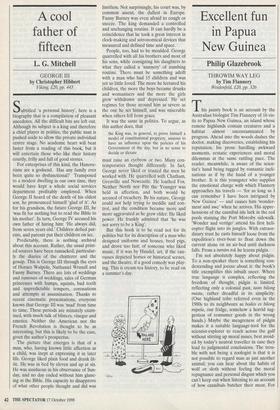A cool father of fifteen
L. G. Mitchell
GEORGE III Subtitled 'a personal history', here is a biography that is a compilation of pleasant anecdotes. All the difficult bits are left out. Although its subject is a king and therefore a chief player in politics, the public man is pushed aside to allow the private individual centre stage. No academic heart will beat faster from a reading of this book, but it will entertain those who like their history courtly, frilly and full of good stories.
For enterprises of this kind, the Hanove- rians are a godsend. Has any family ever been quite so dysfunctional? Transposed to a modest dwelling in our own time, they would have kept a whole social services department profitably employed. When George II heard of the death of his eldest son, he pronounced himself 'glad of it'. As for his grandson, the future George III, he `was fit for nothing but to read the Bible to his mother'. In turn, George IV accused his own father of hating him: 'He always did, from seven years old.' Children defied par- ents, and parents put their children on ice.
Predictably, there is nothing archival about this account. Rather, the usual print- ed sources have been ransacked, particular- ly the diaries of the chatterer and the gossip. This is George III through the eyes of Horace Walpole, Nathaniel Wraxall and Fanny Burney. There are lots of weddings and rumours of weddings, tales of German princesses with humps, squints, bad teeth and unpredictable tempers, coronations and attempts at assassination. Thanks to recent cinematic presentations, everyone knows that George III was 'mad' from time to time. These periods are minutely exam- ined, with much talk of blisters, vinegar and emetics. Neither the American nor the French Revolution is thought to be as interesting, but this is likely to be the case, given the author's prospectus.
The picture that emerges is that of a man, who, having known little affection as a child, was inept at expressing it in later life. George liked plain food and drank lit- tle. He was in bed by eleven and up at six. He was assiduous in his observance of Sun- day, and no day ended without him glanc- ing at the Bible. His capacity to disapprove of what other people thought and did was limitless. Not surprisingly, his court was, by common assent, the dullest in Europe. Fanny Burney was even afraid to cough or sneeze. The king demanded a controlled and unchanging routine. It can hardly be a coincidence that he took a great interest in clock-making and astronomical devices that measured and defined time and space.
People, too, had to be moulded. George quarrelled with all his brothers and most of his sons, while consigning his daughters to what they called a 'nunnery' of numbing routine. There must be something adrift with a man who had 15 children and was yet so little loved. The more he lectured his children, the more the boys became drunks and womanisers and the more the girls grew withdrawn and depressed. He set regimes for those around him as severe as the one he set himself, and was miserable when others fell from grace.
It was the same in politics. To argue, as this author does, that
the King was, in general, to prove himself a model of constitutional propriety, anxious to have an influence upon the policies of his Government of the day, but in no sense to decide or dictate
must raise an eyebrow or two. Many con- temporaries thought differently. In fact, George never liked or trusted the men he worked with. He quarrelled with Chatham, Grenville and Newcastle. He loathed Fox. Neither North nor Pitt the Younger was held in affection, and both would be accused of treachery. By his nature, George could not help trying to meddle and con- trol, and the condition became more and more aggravated as he grew older. He liked power. He frankly admitted that 'he was not sorry to be a King'.
But this book is to be read not for its politics but for its description of a man who designed uniforms and houses, bred pigs, and drove too fast; of someone who liked music, if it was by Handel, art, if the can- vasses depicted horses or historical scenes, and the theatre, if a good comedy was play- ing. This is cream-tea history, to be read on a summer's day.










































































 Previous page
Previous page